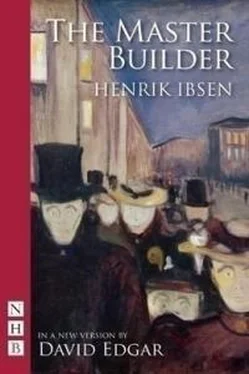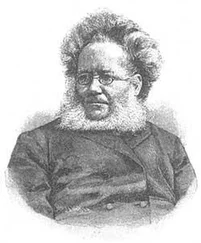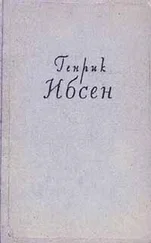[Sharply.] Do you mean that you did not do it?
SOLNESS.
I scarcely know myself. [More softly.] But now I know so much for certain, that I—
HILDA.
That you—? Say it at once!
SOLNESS. —that I ought to have done it.
HILDA.
[Exclaims with animation.] Don't tell me you can ever be dizzy!
SOLNESS.
This evening, then, we will hang up the wreath—Princess Hilda.
HILDA.
[With a bitter curve of the lips.] Over your new home, yes.
SOLNESS.
Over the new house, which will never be a home for me.
[He goes out through the garden door.
HILDA.
[Looks straight in front of her with a far–away expression, and whispers to herself. The only words audible are:]—frightfully thrilling
The large broad verandah of SOLNESS'S dwelling–house. Part of the house, with outer door leading to the verandah, is seen to the left. A railing along the verandah to the right. At the back, from the end of the verandah, a flight of steps leads down to the garden below. Tall old trees in the garden spread their branches over the verandah and towards the house. Far to the right, in among the trees, a glimpse is caught of the lower part of the new villa, with scaffolding round so much as is seen of the tower. In the background the garden is bounded by an old wooden fence. Outside the fence, a street with low, tumble–down cottages.
Evening sky with sun–lit clouds.
On the verandah, a garden bench stands along the wall of the house, and in front of the bench a long table. On the other side of the table, an arm–chair and some stools. All the furniture is of wicker–work.
MRS. SOLNESS, wrapped in a large white crepe shawl, sits resting in the arm–chair and gazes over to the right. Shortly after, HILDA WANGEL comes up the flight of steps from the garden. She is dressed as in the last act, and wears her hat. She has in her bodice a little nosegay of small common flowers.
MRS. SOLNESS.
[Turning her head a little.] Have you been round the garden, Miss Wangel?
HILDA.
Yes, I have been taking a look at it.
MRS. SOLNESS.
And found some flowers too, I see.
HILDA.
Yes, indeed! There are such heaps of them in among the bushes.
MRS. SOLNESS.
Are there, really? Still? You see I scarcely ever go there.
HILDA.
[Closer.] What! Don't you take a run down into the garden every day, then?
MRS. SOLNESS.
[With a faint smile.] I don't "run" anywhere, nowadays.
HILDA.
Well, but do you not go down now and then to look at all the lovely things there?
MRS. SOLNESS.
It has all become so strange to me. I am almost afraid to see it again.
HILDA.
Your own garden!
MRS. SOLNESS.
I don't feel that it is mine any longer.
HILDA.
What do you mean—?
MRS. SOLNESS.
No, no, it is not—not as it was in my mother's and father's time. They have taken away so much—so much of the garden, Miss Wangel. Fancy—they have parcelled it out—and built houses for strangers—people that I don't know. And they can sit and look in upon me from their windows.
HILDA.
[With a bright expression.] Mrs. Solness!
MRS. SOLNESS.
Yes?
HILDA.
May I stay here with you a little?
MRS. SOLNESS.
Yes, by all means, if you care to.
[HILDA moves a stool close to the arm–chair and sits down.
HILDA.
Ah—here one can sit and sun oneself like a cat.
MRS. SOLNESS.
[Lays her hand softly on HILDA'S neck.] It is nice of you to be willing to sit with me. I thought you wanted to go in to my husband.
HILDA.
What should I want with him?
MRS. SOLNESS.
To help him, I thought.
HILDA.
No, thank you. And besides, he is not in. He is over there with his workmen. But he looked so fierce that I did not dare to talk to him.
MRS. SOLNESS.
He is so kind and gentle in reality.
HILDA.
He!
MRS. SOLNESS.
You do not really know him yet, Miss Wangel.
HILDA.
[Looks affectionately at her.] Are you pleased at the thought of moving over to the new house?
MRS. SOLNESS.
I ought to be pleased; for it is what Halvard wants—
HILDA.
Oh, not just on that account, surely?
MRS. SOLNESS.
Yes, yes, Miss Wangel; for it is only my duty to submit myself to him. But very often it is dreadfully difficult to force one's mind to obedience.
HILDA.
Yes, that must be difficult indeed.
MRS. SOLNESS.
I can tell you it is—when one has so many faults as I have—
HILDA.
When one has gone through so much trouble as you have—
MRS. SOLNESS.
How do you know about that?
HILDA.
Your husband told me.
MRS. SOLNESS.
To me he very seldom mentions these things.—Yes, I can tell you I have gone through more than enough trouble in my life, Miss Wangel.
HILDA.
[Looks sympathetically at her and nods slowly.] Poor Mrs. Solness. First of all there was the fire—
MRS. SOLNESS.
[With a sigh.] Yes, everything that was mine was burnt.
HILDA.
And then came what was worse.
MRS. SOLNESS.
[Looking inquiringly at her.] Worse?
HILDA.
The worst of all.
MRS. SOLNESS.
What do you mean?
HILDA.
[Softly.] You lost the two little boys.
MRS. SOLNESS.
Oh, yes, the boys. But, you see, that was a thing apart. That was a dispensation of Providence; and in such things one can only bow in submission—yes, and be thankful, too.
HILDA.
Then you are so?
MRS. SOLNESS.
Not always, I am sorry to say. I know well enough that it is my duty—but all the same I cannot.
HILDA.
No, no, I think that is only natural.
MRS. SOLNESS.
And often and often I have to remind myself that it was a righteous punishment for me—
HILDA.
Why?
MRS. SOLNESS.
Because I had not fortitude enough in misfortune.
HILDA.
But I don't see that—
MRS. SOLNESS.
Oh, no, no, Miss Wangel—do not talk to me any more about the two little boys. We ought to feel nothing but joy in thinking of them; for they are so happy—so happy now. No, it is the small losses in life that cut one to the heart—the loss of all that other people look upon as almost nothing.
HILDA.
[Lays her arms on MRS. SOLNESS'S knees, and looks up at her affectionately.] Dear Mrs. Solness—tell me what things you mean!
MRS. SOLNESS.
As I say, only little things. All the old portraits were burnt on the walls. And all the old silk dresses were burnt, what had belonged to the family for generations and generations. And all mother's and grandmother's lace—that was burnt, too. And only think—the jewels, too! [Sadly.] And then all the dolls.
HILDA.
The dolls?
MRS. SOLNESS.
[Choking with tears.] I had nine lovely dolls.
HILDA.
And they were burnt too?
MRS. SOLNESS.
All of them. Oh, it was hard—so hard for me.
HILDA.
Had you put by all these dolls, then? Ever since you were little?
MRS. SOLNESS.
I had not put them by. The dolls and I had gone on living together.
HILDA.
After you were grown up?
MRS. SOLNESS.
Yes, long after that.
HILDA.
After you were married, too?
MRS. SOLNESS.
Oh yes, indeed. So long as he did not see it—. But they were all burnt up, poor things. No one thought of saving them. Oh, it is so miserable to think of. You mustn't laugh at me, Miss Wangel.
HILDA.
I am not laughing in the least.
MRS. SOLNESS.
For you see, in a certain sense, there was life in them, too. I carried them under my heart—like little unborn children.
DR. HERDAL, with his hat in his hand, comes out through the door, and observes MRS. SOLNESS. and HILDA.
Читать дальше









